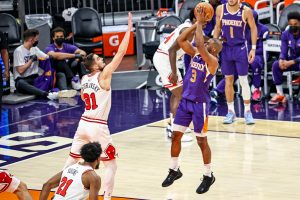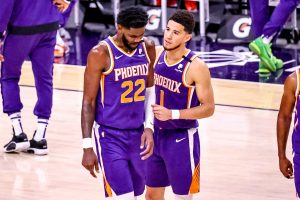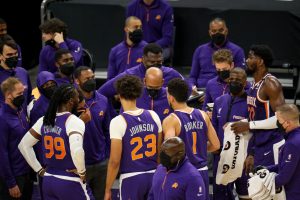- Slug: Sports-Suns Playoff Keys, 2,360 words
- 3 photos available (thumbnails, captions below)
By Trevor Booth
Cronkite News
PHOENIX – Suns coach Monty Williams has used several phrases that stuck with his players throughout their 2020-21 season. Asked about one that stood out, veteran forward Jae Crowder recalled a tangible example that epitomizes his team’s mentality as it approaches its first playoff appearance since 2009-10.
“One day, he gave everyone screws, like wrenches, a screwdriver, he passed them all around,” Crowder said. “We was like, ‘What is this?’ We’re all holding screwdrivers.
“He’s like, ‘We got to continue to tighten the screws.’”
Entering its final two regular-season contests against the San Antonio Spurs, Phoenix still has multiple areas it needs to tighten up. Before their thrilling 118-117 win over the Portland Trail Blazers on Thursday night, the Suns lost three of four games for the first time since late January, a product of them loosening their grip on an otherwise sturdy season.
Phoenix lost consecutive games to the Los Angeles Lakers and Golden State Warriors on Sunday and Tuesday, respectively, when matchup issues and breakdowns were at the forefront of their struggles. Lakers forward Anthony Davis had 42 points and 12 rebounds against a smaller Suns rotation, while the Warriors shot 36 of 45 from inside the 3-point line and used a 30-18 fourth quarter to win that game late.
The Suns snapped that streak against the Trail Blazers, guaranteeing them a top-3 seed in the Western Conference. Currently at No. 2, Phoenix trails the first-place Utah Jazz and owns the tiebreaker between the two teams. The Suns lead the third-place Los Angeles Clippers by two games and can clinch a top-two seed with one more win.
However, Phoenix has bigger issues to address, Williams said, than its seeding. Suns center Deandre Ayton, who has a top-15 defensive rating in the NBA according to Statmuse, did not play against Portland due to left knee soreness.
Phoenix backup forward Cameron Johnson has also missed the last four games due to a right wrist sprain. It has forced the Suns to experiment with different lineups late in the season, something that Williams indicated is not ideal but should not be a long-term concern.
“Not as comfortable as you would like with guys being in and out, a few injuries that we’ve had,” he said. “But that’s OK. When I’m watching different games around the league, I see coaches dealing with the same thing. Guys resting or guys being out, for whatever reason. I don’t think many teams are in a playoff rotation mode now because of the number of games we’ve played, back-to-backs and the travel.”
With the Suns holding the second-best record in the NBA, teams have played them with more intensity, something they have struggled to match in the last week. Possessing a younger roster with only three players who have played at least 30 postseason games – Crowder, starting point guard Chris Paul and backup wing Torrey Craig — Phoenix will have to play more consistently to win games.
Ahead of the NBA play-in tournament next week, here’s a look at five keys for the Suns to maximize their postseason potential.
Booker, Paul at the forefront
When the Suns traded for Paul in the offseason, they made it clear they were pursuing a contending roster. But the success he has led them to has arguably been one of the biggest surprises of this NBA season.
Paul is averaging 16.3 points and 8.9 assists per game, which ranks third in the league behind Washington’s Russell Westbrook (11.7) and Atlanta’s Trae Young (9.5). He ranks in at least the 80th percentile of all point guards in effective field goal percentage (55.5), free throw percentage (93.3), assist rate (16 percent) and defensive rebound percentage (13.7), among other statistics according to Cleaning the Glass.
However, Paul’s impact goes far beyond his statistics. A 15-year veteran whose teams have missed the postseason just three times, Paul’s presence has been invaluable for Phoenix’s players, several of whom were not previously on a team with a .500 or better record.
Now, he will be expected to lead the Suns to a strong postseason performance. Phoenix has not finished with a top two record in the Western Conference since the 2006-07 season and has a chance to extend a strong campaign further.
“The expectations coming into this season, I’m not quite sure anybody thought we’d be in this position,” Williams said. “But we’re here, and we got to take advantage of it and Chris has been a huge part of that. He’s helped our team and our guys individually in so many ways, and there’s a lot left in this season and we’re looking forward to many more games.”
Paul will be relied on to guide the Suns through important possessions in the postseason, something he has done repeatedly through 109 career playoff games. He is currently tied for the seventh-best clutch rating in the NBA – starting forward Mikal Bridges is tied for fourth and Ayton is also tied for seventh – and has carried that burden into the playoffs before.
The same standard will apply for starting shooting guard Devin Booker. Though he has not appeared in the playoffs before, he has been the face of the Suns’ franchise for multiple years with questions lingering about his ability to lead a team to success.
Booker is having one of the most efficient seasons of his career, holding a 53.2 effective field goal percentage with Paul at his side. He was named an All-Star for the second straight season and Western Conference Player of the Week three times this season, becoming the first Suns player to do so since Steve Nash in 2006-07.
Now, he has a chance to elevate his play on the biggest stage. It’s something that he has craved and that his team will need as it competes for a championship.
“Try to win basketball games, that’s what we got to do at the highest level, and that time is now,” he said. “People are fighting for positioning and seeding and home court or whatever’s going on. But the games’ (are) about to ramp up. They’re going to be high-intensity games and we have to be ready for them.”
Health
The Suns have not had overwhelming health concerns since the middle of February, when multiple rotational players were often out due to injury or health and safety protocols. That has changed in the last few weeks.
Johnson, one of six Suns players who averages at least 20 minutes per game, has not played since May 5 due to a right wrist injury. Crowder missed eight games from April 22 to May 5 due to a right ankle sprain, and backup forward Dario Saric did not play in three contests from April 25 to April 28 due to ankle injury management.
On Thursday, the Suns were without Ayton for the first time this season. Williams said he was not aware of any soreness to Ayton during Phoenix’s previous two games and did not convey any timetable for his return.
“I don’t have anything to report on that,” Williams said. “He’s just out.”
If Ayton is out for an extended period of time, it would greatly hurt the Suns’ efforts, especially on the defensive end. He is arguably their only shot-blocking threat with Saric and forward Frank Kaminsky as depth options and is trusted to anchor his team on that end and play in multiple coverages.
Offensively, Ayton ranks second on his team among current rotational players with a 63.0 percent effective field goal percentage and is a threat to finish above the rim and at times in the low post. Without him, the Suns are a very different team, and perhaps one that won’t be able to execute at the same level it has all season.
Personnel and rotation
Earlier this season, Williams said that he had not coached a bench unit like the one on this year’s Suns team in terms of its depth of talent. That can be a blessing or a curse come playoff time.
Due to injury and necessity, Phoenix has had multiple players in and out of its rotation all season. Backup combo guard Jevon Carter has played in each of the Suns’ last 24 games after not playing in 12 of their previous 29 contests. Guard Langston Galloway appeared in nine straight games from March 15 to March 30 but has not played in 20 of Phoenix’s last 24 contests, and Kaminsky has played at least 10 minutes in its last 11 games after not appearing in 17 of his last 20 contests.
Despite those changes, Kaminsky said on Thursday that he felt comfortable with his role.
“I know what I need to do on a night-to-night basis to go in there and help our team win,” Kaminsky said. “Some nights, it might be trying to be a little bit more aggressive on offense. Some nights, it might be trying to do things a little bit differently on defense. It’s kind of different depending on who we play, but that’s going to be the playoffs. There’s going to be a lot of different challenges that are presented to us and a lot of different players and a lot of different schemes that we’re going to have to go out and execute (against).”
Once the postseason begins, teams may employ a thinner rotation to ensure consistency and continuity with their schematic adjustments and personnel. The Suns could use a deeper bench, but they must make sure the pieces fit.
On Sunday, Davis and the Lakers exploited Phoenix’s smaller rotation with Craig at power forward. Davis got several easy looks in the low post and from mid-range extended due to his height and length, something the Suns must combat if they play Los Angeles in the first round.
On Tuesday, the Warriors ran Ayton through a multitude of off-ball screen actions, opening lanes to the rim for them to attack. Golden State had 29 second-chance points in that game and shot a very high percentage from inside the arc, allowing them to win the game despite All-Star guard Stephen Curry shooting just 7 of 22 from the field.
Phoenix had trouble matching personnel in a Feb. 18 loss to the Brooklyn Nets and has been prone to those issues at different points this season. It is something that Williams and his staff will have to hone in on, or else the Suns may not have any answers for in-game adjustments.
Intensity
Multiple players who have been considered a part of Phoenix’s core from the last few seasons – Booker, Ayton, Johnson and Bridges – will play in the postseason for the first time in their careers. The environment will be much different than the regular season, something the Suns have experienced firsthand in the last week.
With recent opponents fighting for playoff positioning, Phoenix has been prone to slow starts in its last few games. The Suns fell behind the New York Knicks by seven at halftime last Friday and trailed the Lakers 30-19 after the first quarter on Sunday
Even after they built a double-digit first-half lead against the Warriors on Tuesday, the Suns could not finish the game, succumbing to a 30-18 fourth quarter and an 8-0 run from Golden State to seal the game late. It is a theme they are continuing to address.
“I think everybody’s trying to send a message because we’re playing teams that we could possibly play in the playoffs,” Williams said. “And all of these guys have experience that we don’t have. So our guys are learning how it’s going to be, and I think it’s going to be even more intense as we go forward.”
Booker has not been in the postseason yet but understands the importance of every possession.
“It’s just understanding that’s how it’s going to be,” he said. “Every detail matters. Historically watching games in the playoffs, they come down to one, two or three possessions and you have to execute, you have to be locked in on all levels because every possession matters.”
Phoenix’s inexperience in a postseason-type setting has partially shown itself in its last few games. How it responds this weekend and in the playoffs will be a big determinant in how far they advance.
Cohesiveness
Based on how they have spoken about their culture, the Suns have been a tight group all season. However, it remains to be seen how they will respond in a postseason setting.
Crowder has reached the highest level of the playoffs of Phoenix’s players, starting 21 games last postseason for the Miami Heat in their trip to the NBA Finals. He said his biggest goal is to be an “open book” to Phoenix’s younger players and help them through several forms of preparation.
“Obviously for myself, you want to feel the best physically, you want to feel fresh mentally going into the postseason, so that’s what I’m working on right now,” Crowder said. “But for my younger teammates and guys who haven’t been in that fire and fight of the playoffs, I just want to be that open book.
“Whatever questions they want to ask, hopefully have the answer for them. If not, get them the right answer, watch film with them, try to get better. Let them know that it’s going to be the hardest level of basketball they’ve ever been a part of, and just try to prepare them as much as possible.”
Phoenix has bought into its culture under Williams and schematics all season. Those will all be tested in the coming weeks, something that only the toughest teams can manage.
Will the Suns be able to tighten their screws and do so? It remains to be seen.
“We’ve had a really good regular season so far but the intensity of these games, I think it’s good for us,” Paul said. “We’re going to keep learning from them. At the end of the day, we still got a young team and all these situations that we’re in right now are new for us. So we’re going to keep going. “
For more stories from Cronkite News, visit cronkitenews.azpbs.org.


